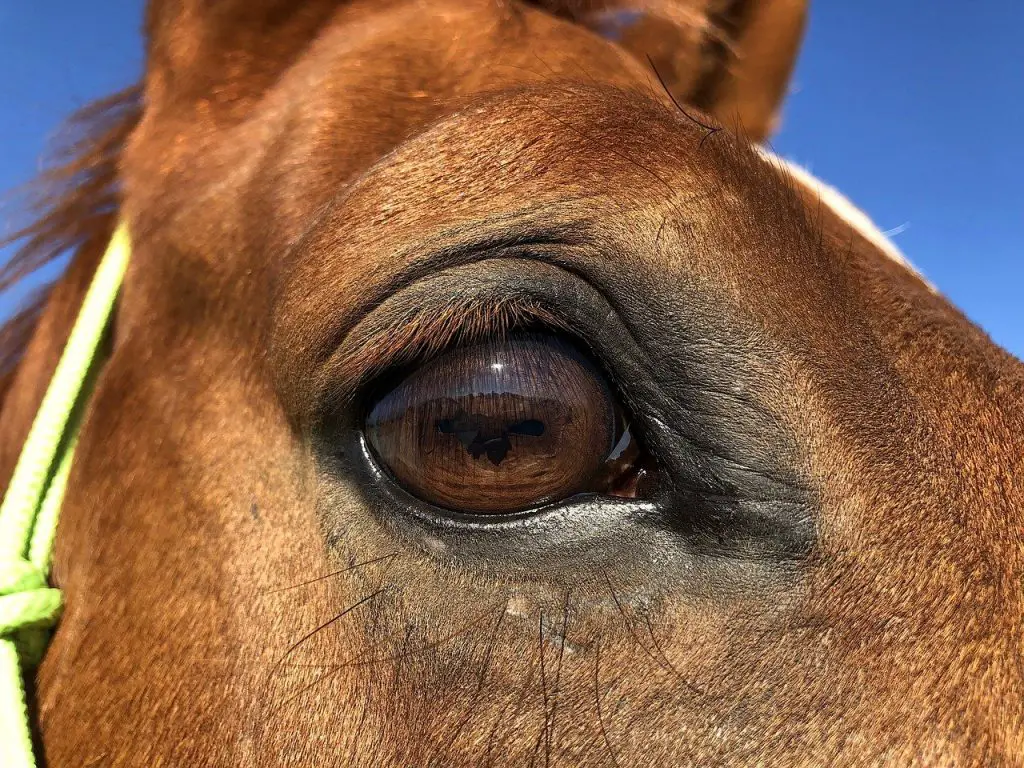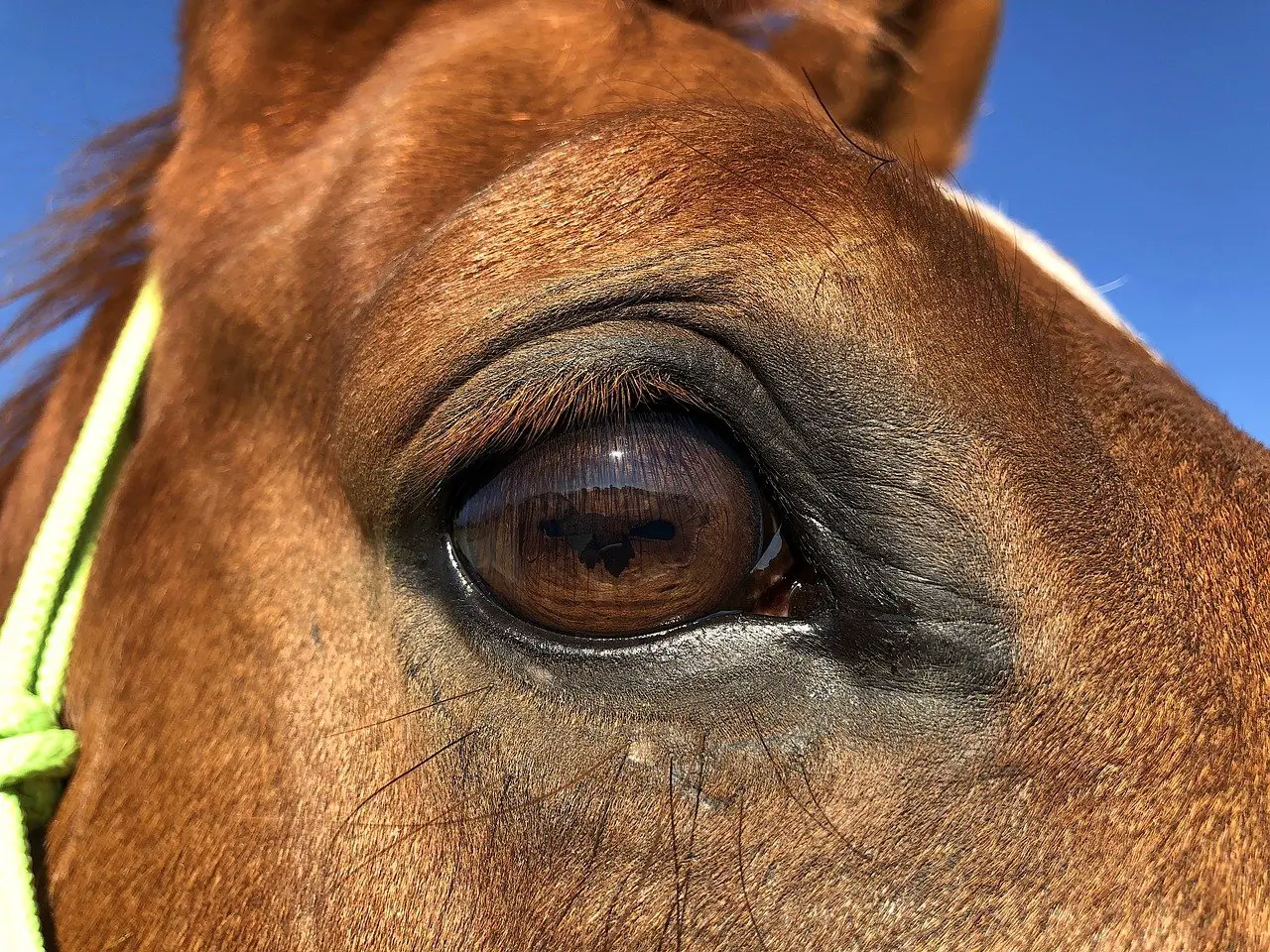Last Updated on March 23, 2022 by Allison Price
It is easy to conclude that tears are emotional when we see water around our eyes.
This is because humans, as individuals, can cry from emotional distress caused by grief or happiness. Emotional crying is a human phenomenon. While animals may shed tears as part of their normal functions, there is no evidence to support that this emotion is the cause.
Horses are intelligent and have their own personalities. This often leads to people asking if horses cry or weep like humans. However, this does not mean they don’t shed tears for other reasons. We will talk more about these.
Are Horses able to cry?
Horses don’t cry, but they do shed tears. Horses shed tears when their tear glands become blocked or irritants get in the eyes.
They will feel as if they are shedding tears and their faces will become reddened. Horses don’t “cry” as we understand it, but this doesn’t mean they aren’t feeling emotions.
What are Horse’s Tears and Why Are They Physically There?
There is only one difference between horse and human tears. Horses’ tears are triggered by something physical, while humans’ can result from emotional responses or physical interactions. Horses’ tear ducts work the same as human’s and are fully functional. These tears are a result of a variety of factors.

- Your horse is experiencing an eye irritation. It could be a stuck eyelash, or the eye itself. It could be a blocked tear tube if your horse has constant tears streaming down its face, but it has not changed in any way (no sores and no lameness).
- A blocked tear duct has been found in this horse. A tear duct’s main function is to drain excess tears from the eyes and nose. The tear duct can become blocked with debris or biological matter. If this happens, the tears will pool at the bottom and spill out onto the face.
- What causes a blocked tear tube? Common reasons include dust, dirt particles in the air, or mucus in the eyes. If a horse’s tear tube is more narrow in shape, it can cause it to block faster.
- How can it be fixed? You can flush a blocked tear duct with saline. The horse’s nose is run through a small tube. This tube will reach the end of the tear duct. The procedure is done by a veterinarian who is certified in equine medicine and is painless for the horse.
- Horses can be irritated by environmental factors. Environmental irritations can cause tears to leak, just like a stuck eyelash can. Things like dust particles, small grains, hay particles and even flies can all cause tears to flow. A simple flush of the eye can remove this condition.
- An infection may be affecting your horse’s eye. Conjunctivitis is a bacterial infection in which the eye causes swelling, inflammation, and tears. The eye can swell completely and leak out mucous if it is severely infected. An eye infection can make your horse extremely sensitive and may become uneasy if you touch it. Trauma to the eye tissues can cause an infection that eventually leads to a bacterial infection.
- Flies can cause eye infections by being attracted to the water in a horse’s eyes. Infection can occur when bacteria left behind by the fly is rubbed into the eyelid membranes.
- Windblown dust can also cause an eye infection. Horses may rub the dust in their eyes, resulting in infection. Antibiotic eye drops can be used to treat the infection.
- However, general inflammation may also be the cause. You will need to identify the root cause.
How do you manage a horse with a swollen eye?
You should immediately assess your horse if they have a swollen or enlarged eye. A swollen eyelid or around the eye indicates that there has been a trauma to the horse or that the horse has had a foreign body in the eye.
You will need to look for signs of injury and look for foreign bodies or abnormalities. Then, immediately report these findings to your veterinarian. You should examine both eyes and note down any symptoms. If symptoms are not obvious and your eye appears normal, you should call your vet immediately. However, if your eye feels painful or inflamed, contact an emergency room during operating hours.
It may be possible to flush the horse’s eyes with saline, or use drops/ointment for his eyes. Before you do this, it is best to have your vet give you the go ahead. To prevent any other items from getting in the horse’s eyes or around it, a fly mask is a good idea.
Can I ride my horse with a fly mask?
Flies can be very irritating to horses and require a lot more work to get rid of them.
Fly masks can be used to ride horses, but not all masks are suitable. Some masks won’t feel comfortable while riding, others won’t let your horse see through them and some won’t fit properly onto your horse’s bridle. Here are some tips for finding the right fly mask.
- Choose a helmet that was specifically made for riding.
- Make sure you choose a quality one made from non-abrasive materials with a soft lining.
- It should fit your horse’s head so it can rest comfortably against their faces. The mask should be at least one inch below the horse’s cheekbones. This will ensure that the mask is completely covered.
- Your horse must have complete clearance from the fly mask. It must not touch the horse’s eyes or their eyelashes. To prevent contact, most riding fly masks have insets or darts that are rounded.
- Make sure to inspect the mask for any rips or worn areas. Also, make sure there aren’t any stray fibers or meshes that could cause problems. Replace the mask if you find any of these, or any sores or rubs after riding with it.
- If you live in an area with midges or gnats, consider buying a fly mask and ear bonnets. Your horse might not like the idea of having their ears covered.
You should also ensure that the mask does not fit too tightly against your horse’s head. The mask can cause sores and rubs to sensitive areas of the horse’s face.
Make sure to take off the fly mask before your horse goes to bed at night.


